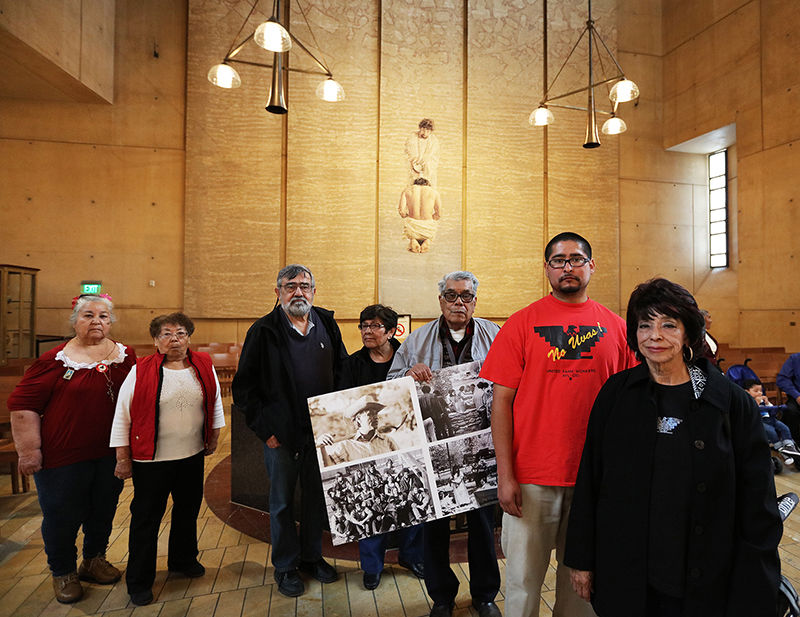A half century ago, the U.S. and the world saw the shadow of a long human chain of peaceful marchers making their way from Delano to Sacramento. They walked to draw attention to the abuses of farm workers in the nation.
Cesar Chavez led 77 men and women who worked in the fields on March 17, 1966. They processed nearly 350 miles behind an image of Our Lady of Guadalupe and eventually drew other workers, students and religious leaders. By the time the march arrived at Sacramento April 10 of that year, it was 10,000 strong.
Over the 25 days, participants suffered exhaustion, pain and the uncertainty of not knowing how to maintain their families. But they supported each other, fomented by the love they found on the way.
This year, Archbishop José H. Gomez celebrated a Mass to commemorate the march at the Cathedral of Our Lady of the Angels April 10. The faithful, syndicate leaders and various members of the United Farm Workers union filled the cathedral to remember the work of Cesar Chavez, who was inspired by the peace and justice teachings of the Catholic Church.
Before the Mass, 10 of those who participated in the 1966 march processed carrying images and artifacts from the original demonstration. They placed an image of Cesar Chavez by the altar while the choir sang “De Colores.”
Roberto Armando Bustos, who Chavez named captain of the march when he was a young grape picker, was among the group.
“Before the march we were like the forgotten. With the march from Delano to Sacramento, people began to notice how we lived and they began to help,” he said.
In addition to long workdays with low pay, “farm workers were ill treated. There were neither bathrooms for the workers in the field, nor fresh water. They spread pesticides on the crops while we were in the field,” the 74-year-old Bustos remembered. Despite being retired, he continues to help the UFW.
“When Cesar arrived to my ranch and spoke about organizing, we went to accompany him. Wherever we went, we explained to people what we were doing and many began to join us. We almost always slept in parks, and sometimes we were offered a house,” he said.
“People would give us sandwiches, water,” he added. “Many religious and volunteers helped us. With this march and the movement, many good changes took place in the life for those working in the field. Mr. Chavez showed me how to defend myself, and so I fought for others.”
Before the archbishop began the Mass, Lucy Boute of the Office of Life, Justice and Peace, asked the faithful to join in a prayer dedicated to Chavez that members of the UFW recite. Later, there was a moment of silence for those who had given their lives to better the life of others.
The archbishop welcomed Chavez family members and members of the United Farm Workers union, and those who “accompanied Cesar in his historic journey to Sacramento. We continue on the journey. It’s a testament of how Cesar inspires us all.”
The archbishop noted that the civil rights leader was inspired by his faith to defend farm workers.
At the end of his homily, the archbishop asked for prayers for the dignity of those workers, especially the farm workers and those who continue to suffer the absurd and obsolete immigration system in our country. We will pray so that soon we will have the immigration reform we so urgently need.”
Paul Chavez, one of Cesar’s sons and the president of the Cesar Chavez Foundation, thanked the archbishop and the Church for commemorating the life of his father.
“Those who marched 50 years ago inspired a movement among the people and the nation,” he said. “My father knew that ‘the cause’ was much bigger than any one person, so the best way to honor his legacy is to honor those men, women and children who are responsible for the abundant harvest of this nation, and who many times don’t have enough for their own tables … and to continue fighting in a non-violent way on their behalf.”
In an interview with Vida Nueva, Paul Chavez said he was 7 when the march took place. “I remember how impressive it was to see them walk. There the people were with tears, offering water and supporting the sacrifice of the pilgrims. The shout of the farm worker was heard throughout the United States.”
Arturo Rodriguez, the current president of the United Farm Workers, thanked the archbishop for his work on behalf of immigration reform, and called the day a historic one for farm workers.
“They were the first to make that journey during a time when no one knew about the battle,” he said, asking those who marched to stand. Among them were Bustos, Carolina Franco, Maria Valenzuela, Antonia Zamurano, and others, not to mention the family members of those who had died. They received a long applause.
“In the last 50 years, we have secured contracts with industries like grape, strawberry, wine, dairy, but there’s still much more to do. The workers in the fields are the only ones in the country that still don’t receive pay for overtime work,” he said.
“When you are eating fruits and vegetables, think about those men and women who are making the sacrifice to ensure you have them at your tables, and think about how we can help them so they will receive the pay they deserve for their work.”

